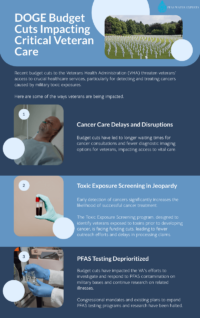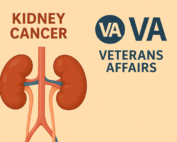Introduction
Amid a growing national conversation about toxic PFAS exposure and veterans’ health, alarming developments have emerged from within the Department of Veterans Affairs (VA). In recent months, significant DOGE budget cuts to the Veterans Health Administration (VHA) have begun to ripple through VA healthcare facilities nationwide, with troubling consequences for cancer care, toxic exposure services, and PFAS-related testing and treatment.
Although veterans have long relied on the VA for access to critical care—especially for conditions caused by military occupational exposure—the latest budgetary constraints are now threatening the ability of the VA to meet its obligations under landmark legislation like the PACT Act and to expand urgently needed services for emerging contaminants like PFAS (per- and polyfluoroalkyl substances).
Cancer Care Delays and Diagnostic Disruptions
According to recent reports from internal VA staff and veterans’ advocacy groups, budget shortfalls have resulted in delays in oncology consults, reduced access to diagnostic imaging, and understaffing of specialized cancer clinics.
A 2024 Government Accountability Office (GAO) report revealed that cancer screening timelines for veterans increased by 18% year-over-year, particularly for high-risk cancers like kidney, prostate, and testicular cancer—illnesses already disproportionately impacting veterans exposed to PFAS and firefighting foam chemicals.
Toxic Exposure Screening Under Threat
The Toxic Exposure Screening program—an initiative championed under the PACT Act (Honoring Our Promise to Address Comprehensive Toxics Act of 2022)—is now facing operational strain. Budget restrictions have led to fewer outreach efforts, reduced staffing for toxic exposure registries, and delays in processing claims related to exposure to burn pits, radiation, Agent Orange, and PFAS.
Even prior to the recent DOGE budget cuts, the Toxic Exposure Screening program was already strained. In fact, a March 2024 internal memo leaked to reporters at Military.com noted that toxic exposure screenings in some regional VA hospitals were being deprioritized to allocate staff to core medical services, leaving newly enrolled veterans without access to their required assessments.
This development has prompted concern from members of Congress who supported the PACT Act. Senator Jon Tester, chairman of the Senate Committee on Veterans’ Affairs, stated:
PFAS Testing and Research Deprioritized
Perhaps the most overlooked consequence of the DOGE budget cuts is the undermining of VA efforts to investigate and respond to PFAS contamination and related illnesses.
The VA had previously announced expanded efforts to screen for PFAS chemicals in blood serum and track illness trends linked to contaminated military bases and AFFF firefighting foam exposure. However, funding reductions have reportedly:
- Paused plans to expand PFAS testing pilot programs beyond five medical centers
- Halted several internal epidemiological studies evaluating PFAS exposure and cancer correlation
- Limited coordination with outside research partners, including the CDC and NIH
As PFAS-related illnesses like kidney cancer, testicular cancer, thyroid cancer, ulcerative colitis, and Parkinson’s disease continue to gain legal recognition through AFFF litigation, the VA’s delay in formalizing PFAS exposure care pathways risks leaving veterans unrecognized and untreated.
Veteran Voices: Real Impacts of a System Under Strain
Many veterans are now speaking out about the effects of these cuts on their health journeys:
- Retired U.S. Air Force Master Sgt. Kevin Ferrara, who served at Pease Air Force Base—one of the earliest PFAS-contaminated military sites—has become an outspoken advocate. In interviews and public forums, he’s criticized the VA’s lack of standardized PFAS blood testing and exposure acknowledgment. Ferrara is fighting to push for testing, so firefighters and veterans who’ve risked their lives for their country don’t have to lose them because of the VA’s and military’s inaction.
- Veterans for Common Sense, an advocacy group focused on environmental exposures, filed a formal petition urging the VA to provide transparent PFAS screening and support services as a result of veterans being unable to obtain basic care and testing services for PFAS-related illnesses which were promised under the PACT Act.
- U.S. Navy veteran Robert Allen, who lived near former NAS Brunswick in Maine, told The Intercept about his frustration with the military’s lack of disclosure to service members even when they conducted studies and knew about AFFF’s serious long-term harm to human health. And while the PACT Act codifies into law that veterans receive care for PFAS toxic exposure, his experience, like with other veterans, is filled with frustration.
These firsthand accounts underscore a broader pattern: veterans are sounding the alarm, and systemic inaction is putting their health at further risk.
These stories are not isolated incidents—they are systemic warning signs.
Now with DOGE budget cuts and the slashing of nearly 83,000 VA Healthcare System workers, this will get far worse for veterans who are dependent on timely care – especially veterans diagnosed with a PFAS illness like cancer, ulcerative colitis, or Parkinson’s disease.
The Urgent Need for DOGE Accountability
Veterans’ advocacy groups, including the Veterans Health Policy Institute and the Iraq and Afghanistan Veterans of America (IAVA), are calling for a Congressional inquiry into the impact of DOGE budget reductions, citing multiple disruptions to care delivery across the VA system.
In response to growing pressure, the House Committee on Veterans’ Affairs has scheduled a hearing later this year to investigate resource allocation failures within the VA healthcare system, specifically focusing on cancer treatment capacity and PFAS-related care pathways.
For veteran cancer victims, this is precious time that they may not have.
What Veterans Can Do Now
While system-wide reform may take time, veterans can take immediate action:
- Request toxic exposure screenings in writing and document any denials or delays.
- Contact your VA Patient Advocate and report care interruptions.
- Enroll in the VA’s Burn Pit and Toxic Exposure Registry if you served in affected areas.
- Reach out to advocacy organizations for legal referrals and medical second opinions.
- Demand accountability from your elected representatives—this is a policy failure, not just a healthcare glitch.
- Join the ongoing AFFF Lawsuit for military veterans — Pressure and mounting evidence from veterans in this ongoing litigation will likely have a big impact on future policies.
A Call to Action
The VA system is at a crossroads. While the promises of the PACT Act and expanded PFAS care remain on paper, veterans across the country are experiencing the consequences of budgetary neglect in real time.
DOGE budget cuts are not abstract—they are disrupting cancer treatments, delaying toxic exposure assessments, and weakening PFAS illness response just when veterans need them most.
Veterans and their families cannot afford silence. The time to speak up—for full implementation, for accountability, and for restored funding—is now.





